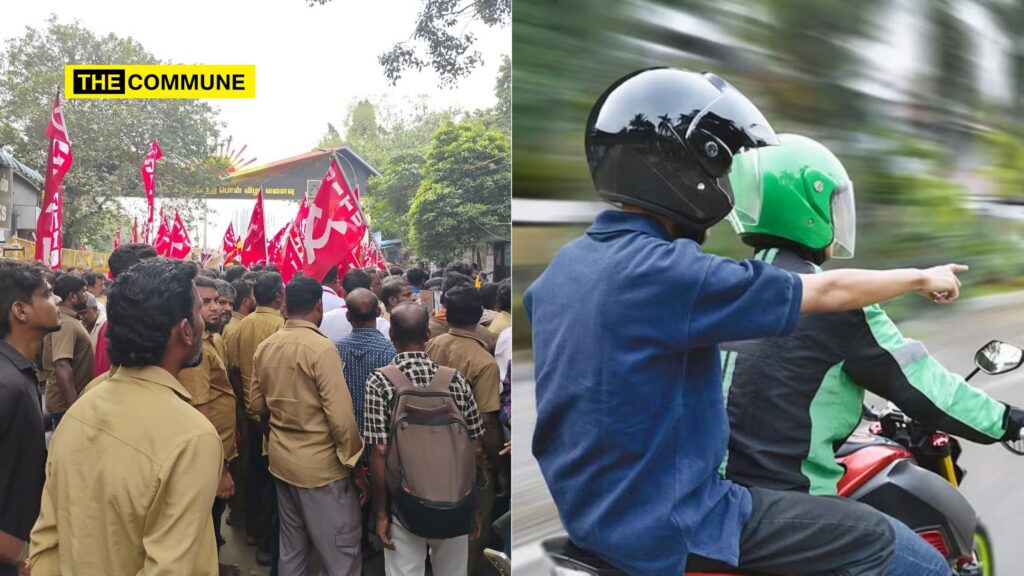Coimbatore witnessed a dramatic protest on 11 December 2024 as over 300 auto drivers gathered at Lakshmi Mills Junction, demanding a ban on bike taxis. The protesters, who removed their shirts and staged a road roko, alleged that bike taxis were violating traffic rules and eating into their livelihoods. Ironically, this protest comes from a group infamous for fleecing passengers with exorbitant fares, refusing to use meters, and disregarding traffic laws.
#Photostory
Over 300 Metered Auto Drivers Stage Protest Near Lakshmi Mills on Avinashi Road, Coimbatore, Demanding Ban on Bike Taxis pic.twitter.com/u2LOAaS66x— SimpliCityCoimbatore (@simplicitycbe) December 11, 2024
The auto drivers claimed that bike taxis were operating without regulation, unlike autos, which require permits, uniforms, and adherence to certain rules. They argued that bike taxis have drastically reduced their earnings, pushing many to the brink of economic distress. Some protesters even went as far as stating that their livelihoods were so threatened they were considering drastic steps like suicide.
தொழிலாளி வயித்துல அடிக்குறதுக்காக இப்படி பன்றாங்க !#AutoDrivers #BikeTaxi #Galatta pic.twitter.com/UTsazzMpSW
— Galatta Media (@galattadotcom) December 11, 2024
However, their demands reek of hypocrisy. The auto drivers’ statements were harshly criticized by consumers who aired their views on social media platforms.
For decades, auto drivers in Tamil Nadu, particularly in Chennai and Coimbatore, have exploited passengers, charging outrageous rates while refusing to improve their services. With the advent of bike taxis, which provide affordable and efficient transportation, passengers finally have an alternative to these exploitative practices—and that seems to be precisely what auto drivers fear.
Auto rickshaw drivers in Tamil Nadu have long earned a notorious reputation for overcharging passengers, especially in cities like Chennai. Instances of charging ₹300–₹400 for trips as short as 6–7 km are alarmingly common. Despite state regulations mandating fare meters, many auto drivers refuse to comply, even operating through platforms like Uber and Ola.
Passengers, particularly women, often report disrespectful behaviour, further cementing the distrust towards auto drivers. While the supply of autos exceeds demand, this excess hasn’t translated into better service or competitive pricing; instead, it has led to aggressive and exploitative practices.
Bike Taxis: A Game-Changer in Urban Mobility
A recent study by KPMG on the potential of bike taxis in India showed that since their introduction, they have emerged as a popular alternative to autos, offering:
- Affordable Rides: Bike taxis cater to budget-conscious commuters significantly cheaper than autos or cabs.
- Convenience: With doorstep pickups and shorter travel times, they address the needs of modern urban mobility.
- Employment Opportunities: They have provided jobs to thousands of young people in urban and semi-urban areas.
KPMG’s research highlights that traffic congestion costs Indian cities billions annually. Bike taxis alleviate this burden by reducing traffic and providing essential last-mile connectivity, an area where auto drivers have consistently failed to deliver.
A reaserch by KPMG on bike taxi.https://t.co/Uqj91B00nd pic.twitter.com/CJQGQwMuyw
— Kasi காசி (@akaasi) December 11, 2024
The protesting auto drivers argue that bike taxis operate without permits and regulations, but their record of flouting laws is well-documented. Refusal to use meters, overcharging, reckless driving, and a lack of accountability are rampant among auto drivers.
Their demands, which include increasing base fares from ₹25 to ₹50 for 1.8 km and raising the per-km charge from ₹12 to ₹25, only underline their unwillingness to adapt to a competitive market. Instead of improving their services, they seek to eliminate competition.
For commuters, the choice is clear. Bike taxis have offered fresh air in a transportation ecosystem dominated by exploitative auto drivers. The protests have only reinforced public frustration with autos, with many voicing support for bike taxis as the more respectful, affordable, and convenient option.
The protests by auto drivers reveal a stark unwillingness to adapt to changing times. Instead of addressing their exploitative practices, they seek to ban bike taxis—a solution that has gained public favour. The government must resist these demands and focus on creating a level playing field, ensuring that commuters continue to have access to affordable and efficient mobility options.
Subscribe to our channels on Telegram, WhatsApp, and Instagram and get the best stories of the day delivered to you personally.

